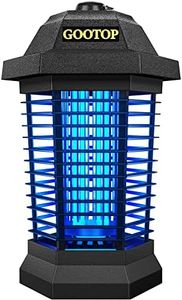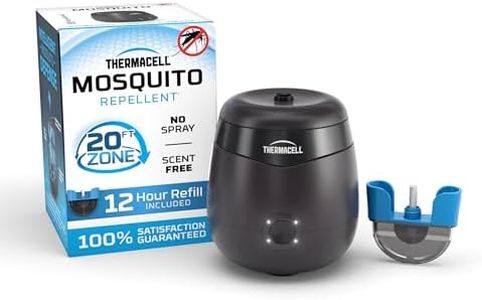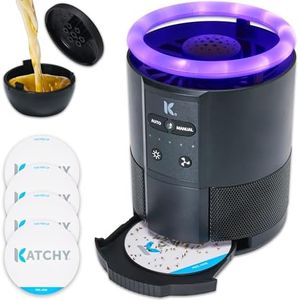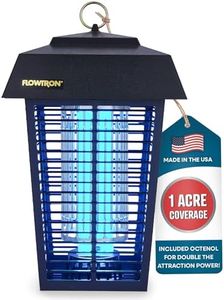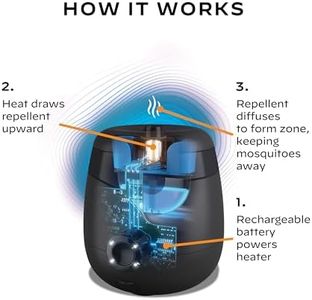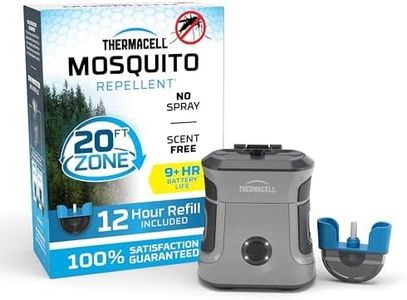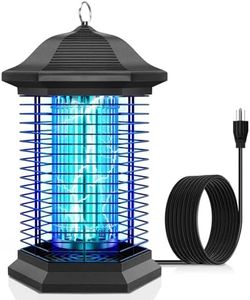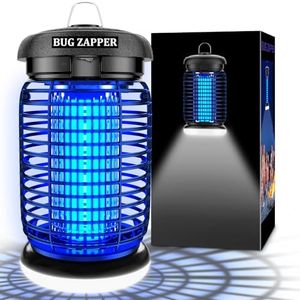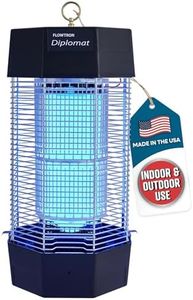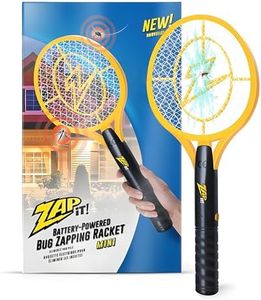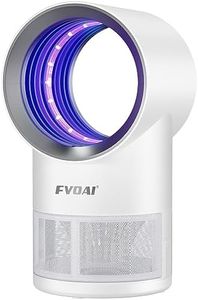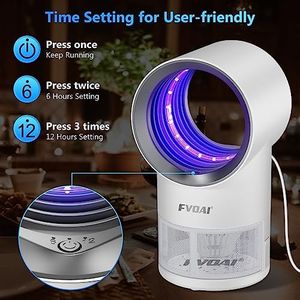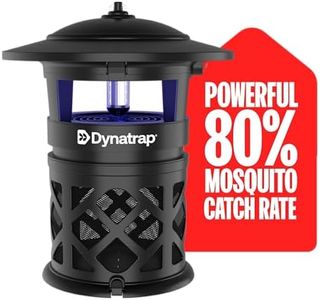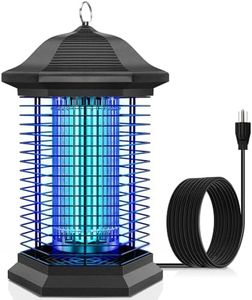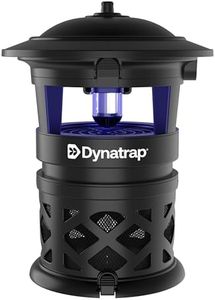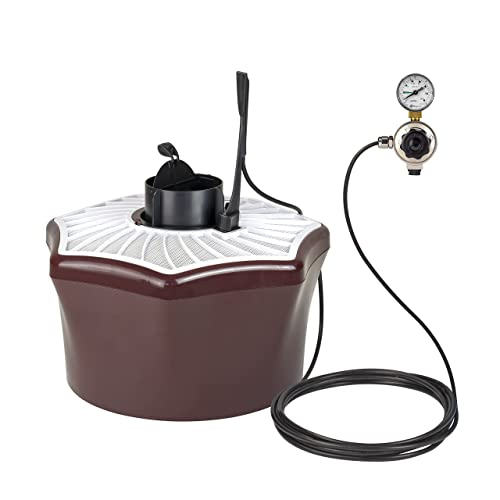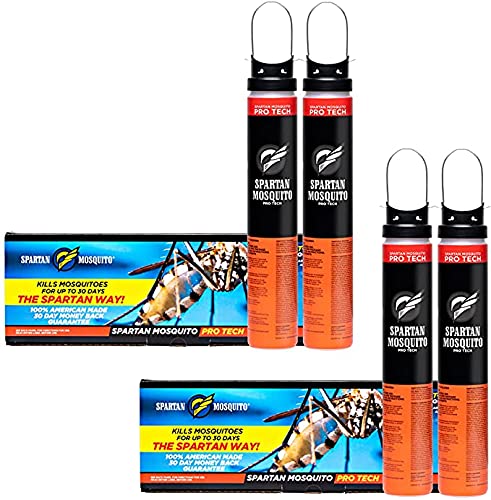10 Best Mosquitoes Traps 2025 in the United States
Winner
GOOTOP Bug Zapper Outdoor, Mosquito Zapper, Electric Fly Zapper, Mosquito Killer, Fly Traps, 3 Prong Plug, Flying Insects Zapper Indoor Outdoor 90-130V, 4200V, ABS Plastic Outer (Black)
The GOOTOP Bug Zapper is an electric mosquito and insect trap designed for both indoor and outdoor use. Its high-voltage grid effectively zaps a variety of flying insects like mosquitoes, flies, and moths when they are attracted to its bulb light. One of its biggest strengths is its chemical-free operation, making it a safer choice for households with pets and small children.
Most important from
19395 reviews
Thermacell Patio Shield E55 Mosquito Repellent E-Series Rechargeable Repeller; 20' Mosquito Protection Zone; Includes 12-Hour Repellent Refill; No Spray, Flame or Scent; Bug Spray Alternative
The Thermacell Patio Shield E55 is a rechargeable mosquito repellent that creates a 20-foot protection zone, ideal for use in backyards, patios, and poolside areas. It works quickly, providing maximum protection within 15 minutes. This portable device is easy to use and can be taken on airplanes, making it a convenient option for travelers.
Most important from
26083 reviews
Katchy Duo Indoor Insect Trap with Scent Pod - Fan Powered with UV Light - Fruit Fly Traps for Indoors - for Fruit Flies, Gnats, Mosquitoes, Moths (Black)
The Katchy Duo Indoor Insect Trap is designed to tackle various indoor pests like mosquitoes, fruit flies, gnats, and moths. Its 2-in-1 trap system uses a 360-degree UV light to lure bugs, combined with a powerful yet silent fan and a glue board to capture them. This means you won't have to deal with the unpleasant zapping noise or mess typical of other traps – a significant advantage for maintaining a peaceful atmosphere indoors.
Most important from
98732 reviews
Top 10 Best Mosquitoes Traps 2025 in the United States
Winner
9.8 score
GOOTOP Bug Zapper Outdoor, Mosquito Zapper, Electric Fly Zapper, Mosquito Killer, Fly Traps, 3 Prong Plug, Flying Insects Zapper Indoor Outdoor 90-130V, 4200V, ABS Plastic Outer (Black)
GOOTOP Bug Zapper Outdoor, Mosquito Zapper, Electric Fly Zapper, Mosquito Killer, Fly Traps, 3 Prong Plug, Flying Insects Zapper Indoor Outdoor 90-130V, 4200V, ABS Plastic Outer (Black)
Chosen by 1201 this week
Thermacell Patio Shield E55 Mosquito Repellent E-Series Rechargeable Repeller; 20' Mosquito Protection Zone; Includes 12-Hour Repellent Refill; No Spray, Flame or Scent; Bug Spray Alternative
Thermacell Patio Shield E55 Mosquito Repellent E-Series Rechargeable Repeller; 20' Mosquito Protection Zone; Includes 12-Hour Repellent Refill; No Spray, Flame or Scent; Bug Spray Alternative
Katchy Duo Indoor Insect Trap with Scent Pod - Fan Powered with UV Light - Fruit Fly Traps for Indoors - for Fruit Flies, Gnats, Mosquitoes, Moths (Black)
Katchy Duo Indoor Insect Trap with Scent Pod - Fan Powered with UV Light - Fruit Fly Traps for Indoors - for Fruit Flies, Gnats, Mosquitoes, Moths (Black)
Flowtron Bug Zapper, 1 Acre of Outdoor Coverage with Powerful 40W Bulb & 5600V Instant Killing Grid, Electric Insect, Fly & Mosquito Zapper, Made in The USA
Flowtron Bug Zapper, 1 Acre of Outdoor Coverage with Powerful 40W Bulb & 5600V Instant Killing Grid, Electric Insect, Fly & Mosquito Zapper, Made in The USA
Dynatrap DT2030SR Fly Traps Outdoor - Mosquito & Flying Insect Killer for 1 Acre – Kills Mosquitoes, Flies, Gnats, Wasps - Bug Zapper Alternative - Black
Dynatrap DT2030SR Fly Traps Outdoor - Mosquito & Flying Insect Killer for 1 Acre – Kills Mosquitoes, Flies, Gnats, Wasps - Bug Zapper Alternative - Black
Our technology thoroughly searches through the online shopping world, reviewing hundreds of sites. We then process and analyze this information, updating in real-time to bring you the latest top-rated products. This way, you always get the best and most current options available.

